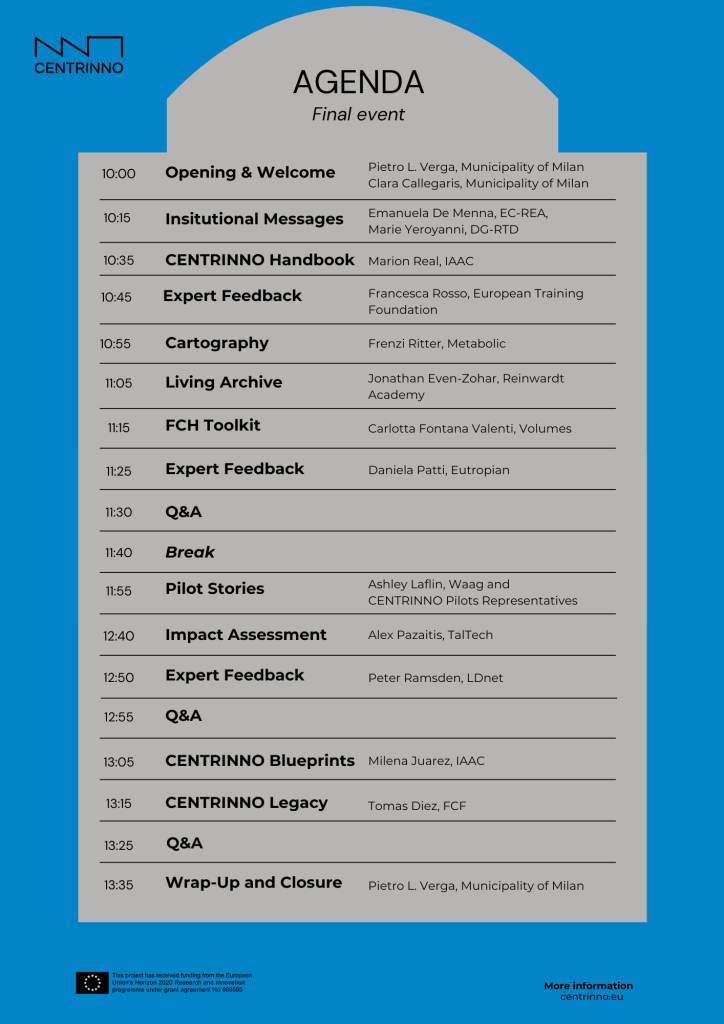
22 February
10:00 AM-1:45 PM
Online
CENTRINNO Final Event
Putting Citizens at the Core of Sustainable Urban Transformation: Reflections and Achievements from Implementation
Marking the end of our 42-month project, this event will provide an overview of CENTRINNO’s key outputs and will showcase the achievements and impact of our nine city pilots.
This final event is your gateway to exploring the innovative endeavors undertaken by CENTRINNO partners and pilot cities. We will present the main results, the platforms generated, and delve into the local impact and success stories. The session will accentuate the synergies and connections forged over the four years of this extraordinary journey, and will be accompanied by the experienced eye of external experts.
Don’t miss the opportunity to get a comprehensive insight into the CENTRINNO project and what it means for the future of urban regeneration and transformation towards a sustainable and circular future.
In practical terms, here is what you will find in this webinar:
- CENTRINNO Handbook: The Centrinno Handbook is an inspiring document that retraces the practices of neighborhood regeneration design throughout the 4 years of Centrinno project. It presents the methodology and supports territorial change-makers, from policy agents, urban planners to designers and citizens to be more familiar with the topic of neighborhood regeneration and be more equipped to develop local interventions to transform old industrial sites into locally productive hubs. It questions, opens, illustrates and culturally embed emerging practices of collective production in urban spaces.
- Cartography: CENTRINNO Cartography is a toolkit to support communities in embarking on a journey to map their local ecosystems. The destination: Resilient, locally productive and circular communities.In a few steps, our Cartography toolkit guides cities and grassroots organizations to discover and map the skills, materials and resources local to the unique surroundings. These resources form the basis for circular communities – a network of individuals, makerspaces, small producers and large manufacturers that share know-how on circular making, exchange resources and wastes, and come up with innovative solutions for real local challenges beyond circularity.
- Living Archive: The Living Archive is an open access platform containing content (stories) stemming from (post-) industrial sites, collected locally with participatory heritage methods. Its purpose is to help communities imagine what can be broadly described as a new ‘critical heritage of making’, and enable the creation of inclusive and circular hubs (Fab City Hubs).
- Fab City Hub Toolkit: The FCH toolkit is a hands-on and living manual for hub managers, local communities, or institutions that want to set up their own Fab City Hub and open a new space to foster local resilience in urban regeneration processes through cross-sectorial and cross-stakeholder collaboration on productive practices. It includes different resources, from the FCH ten principles, to hands-on tools and methods tested and ready to be implemented in your local hub.
- Pilot stories: Deep dive into the stories of our unique 9 pilot cities, and get a glimpse of their journey, main achievements and lessons learned.
- Impact assessment: Impact assessment is done in CENTRINNO through Outcome Mapping (OM), a methodology for planning and assessing projects aiming to bring about sustainable social change. The main idea underpinning OM is that societal structures are created and maintained by people and, thus, long-term changes are in the end changes in human relationships, behaviours and actions. But before these large changes happen, there is a space of intermediary change in between the project’s activities on the ground, and the long-term project objectives.
- CENTRINNO Blueprint & Policy Briefs: Featuring two levels of blueprints, the CENTRINNO Blueprint & Policy Briefs provides actionable insights for implementing the CENTRINNO framework and best practices across European cities. Emphasizing circular economy, heritage preservation, vocational training, innovation spaces, and social inclusion, the blueprints showcase CENTRINNO’s evolution and key outcomes from pilot cities. It details the creation of platforms fostering regenerative neighborhoods, drawing from experiences in cities with different contexts, sizes and local challenges. The knowledge shared serves as a foundation for advocating policy development guidelines for more livable, productive, and inclusive cities.
- CENTRINNO Legacy: what is the legacy of the project and what holds the future? Consolidating the legacy of CENTRINNO is a milestone to build upon and a stepping stone for fostering more urban innovation.
>>REGISTER HERE<<
